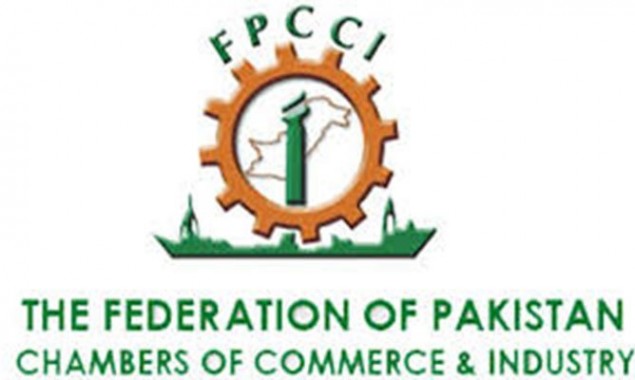
Logo of the FPCCI. Photo: File
KARACHI: The expected additional taxes on industrial raw materials in the planned mini-budget and the hike in power and gas tariffs will further increase the cost of production, an official of a business group said.
The Businessmen Panel (BMP) of the Federation of Pakistan Chambers of Commerce and Industry (FPCCI) has warned of imposing additional taxes, as the government is finalising the mini-budget of Rs360 billion.
Businessmen Panel (BMP) chairman Mian Anjum Nisar said that the government plans to impose more taxes on around 140 industrial raw materials and essential items, besides raising the tax ratio on phone calls, leading to further hike in inflation, which was already in double-digit.
Nisar said that the economic managers attempt to impose new taxes and increasing oil prices along with the hike in power and gas tariffs will ultimately harm the government’s overall move of reducing the production cost for the businesses.
The government has decided to slap 17 per cent general sales tax on at least 140 types of consumable goods and industrial machinery to raise Rs353 billion worth of taxes, he said.
The BMP chairman said the industry is the main victim of this International Monetary Fund (IMF) interference, as the donors’ involvement in Pakistan’s economic matters and dictations to the policymakers for taking harsh measures would add to the economic miseries of the country.
BMP presidential candidate for the FPCCI elections Irfan Iqbal Sheikh said that after new taxes are imposed in the mini-budget, the prices of goods, including milk, cereals, bakery items, meat, chicken, gold, bicycles, cars, electric vehicles and mobile phones will rise, unleashing another wave of inflationary pressure in the country.
The inflation has jumped to 11.5 per cent last month and the State Bank of Pakistan (SBP) has also adjusted its inflation projection upward to 11 per cent for the current fiscal year.
Sheikh said that Pakistan’s inflation rate is the highest among all the South Asian nations, according to a World Bank report.
A major chunk of the revenue will be generated in the mini-budget by slapping a 17 per cent general sales tax at the import stage on nearly 80 items, which are raw materials for the manufacturing of medicines, cereals, live animals, birds and eggs, meat, fish, fresh vegetables, fish feed and animal feed.
The imported plant and machinery will also be subject to 17 per cent sales tax, including those purchased for setting up power generation and transmission projects.
Similarly, the machinery for renewable energy, including solar, wind and nuclear power generation, will also attract 17 per cent general sales tax, he added.
Sheikh said that the world is moving towards alternative sources of electricity generation but the Pakistan government’s policies are contrary to it.
Pakistan is the most frequent customer of the IMF and the governments often depend on borrowing from the the lending arm and accepted stringent conditions, despite the fact that this institution is merciless money lender, which has always forced Pakistan to adopt bad policies like new taxes in the budget, rupee depreciation and massive increases in the electricity and gas tariffs.
It is very unfortunate that the present government has given go-ahead to the economic team to fulfil all the required prerequisites for the revival of the stalled IMF programme under the $6 billion Extended Fund Facility, setting aside the miseries of the trade and industry.
BMP president Mian Anjum Nisar said that the government and the IMF have reached an agreement to revive the stalled $6 billion programme, assigning the task to the government to generate additional Rs360 billion from the trade and industry through new taxes in the mini-budget.
He resented the frequent increase in the electricity and petroleum products’ prices along with the burden of new taxes on the behest of the IMF and termed it dangerous for the economy of the country, as it would make the Pakistani products uncompetitive in the international markets.
Read More News On
Catch all the Business News, Breaking News Event and Latest News Updates on The BOL News
Download The BOL News App to get the Daily News Update & Follow us on Google News.




